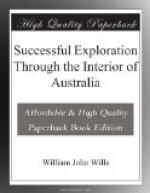The arrangements for the expedition were in progress from 1858 to 1860, under Mr. O’Shannassy, a man far above the common order, who now fills the superior office of Chief Colonial Secretary. He entered into the object with his own peculiar zeal. On his personal responsibility, Mr. Landells, who figures in this narrative, as also in a preceding one, with little credit, was despatched to India to procure camels, those ships of the desert, whose aid in traversing the unknown interior was expected to prove invaluable. “The camels are come!” was the cry when these new and interesting immigrants made their first appearance in Melbourne. All the people were en the qui vive. “What was to be done next? Who was to be the leader? When would the party start?” Mr. Nicholson had by this time taken the place of Mr. O’Shannassy, and he hit on the unfortunate expedient of delegating to the Royal Society of Melbourne the direction of this important expedition. I say unfortunate, because, by this arrangement, the opinions to be consulted were too numerous to expect unanimity. It is true they elected a special committee, which included some who were well qualified for the duty, and others who were less so; but, good or bad, the old adage of “too many cooks” was verified in this instance. Had they all been excellent judges, the course was still objectionable, as divided responsibility falls on no one.
The first point to be settled was the choice of a leader. Meeting after meeting was held, and I must do them the justice to say that, on the whole, no thoroughly unexceptionable candidate offered himself. The necessary combination of physical and scientific requisites was not readily found. The question therefore fell into abeyance for a time on that account. But at length, and after a considerable delay, Robert O’Hara Burke, Esquire, police inspector at the Beechworth district, and afterwards at Castlemaine, was appointed to the post. He was in his fortieth year, experienced, active, and well-connected, of one of the old Galway families, and had held a commission as lieutenant in the Austrian army; on quitting which service, he procured an appointment in the Irish constabulary. There he was so beloved by his men, that several resigned when he left for Australia and accompanied him, in the hope of still serving under their favourite commander. He was a brave and true man, covetous of honour, but careless of profit; one who would have sought reputation “even in the cannon’s mouth.” With his name that of my poor son is indelibly conjoined. From all I have since collected from King, their only surviving companion, Mr. Burke loved my son as a brother; and William, writing of him, says: “The more I see of Mr. Burke the more I like him;” and he wrote with caution, adopted no hasty opinions, and seldom changed them when once formed.




